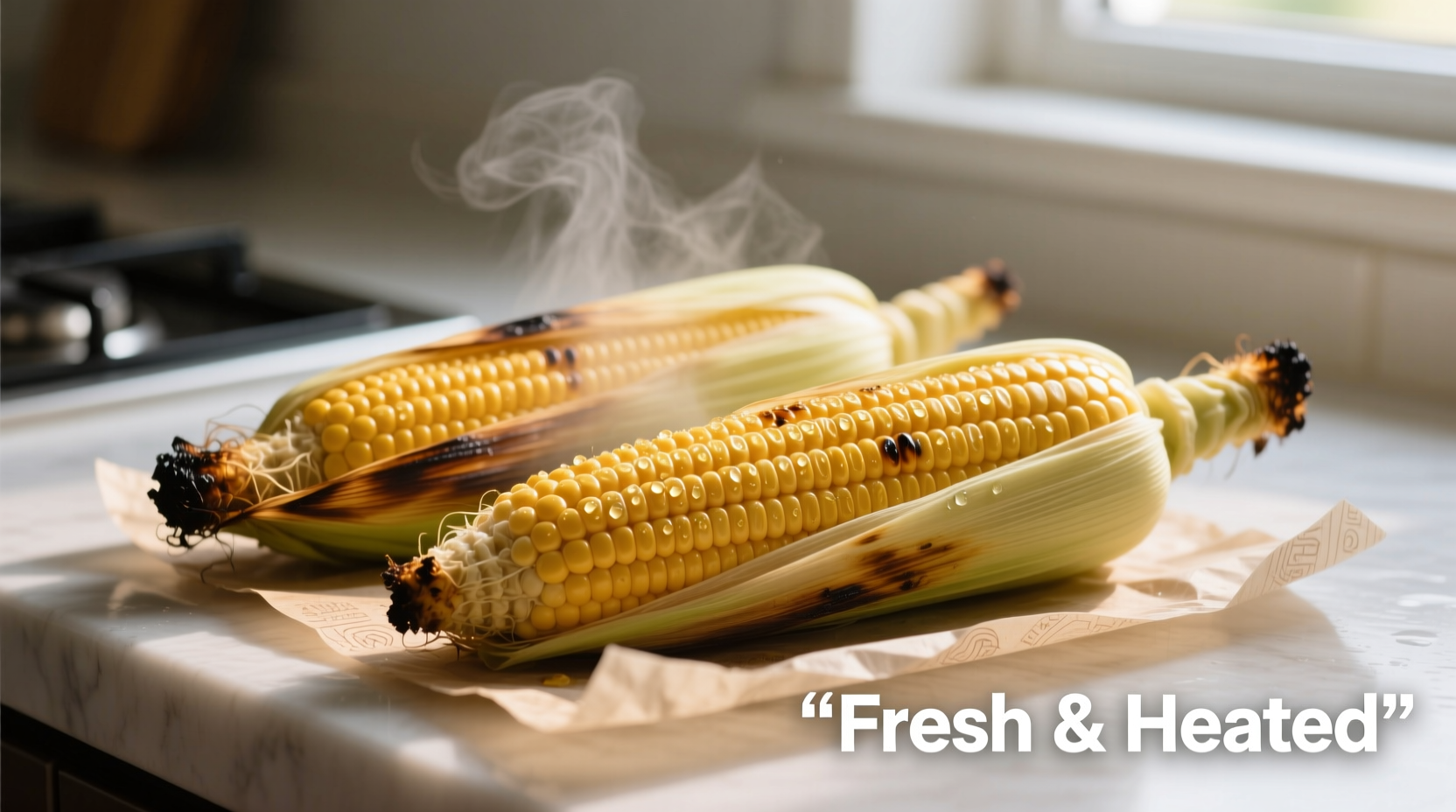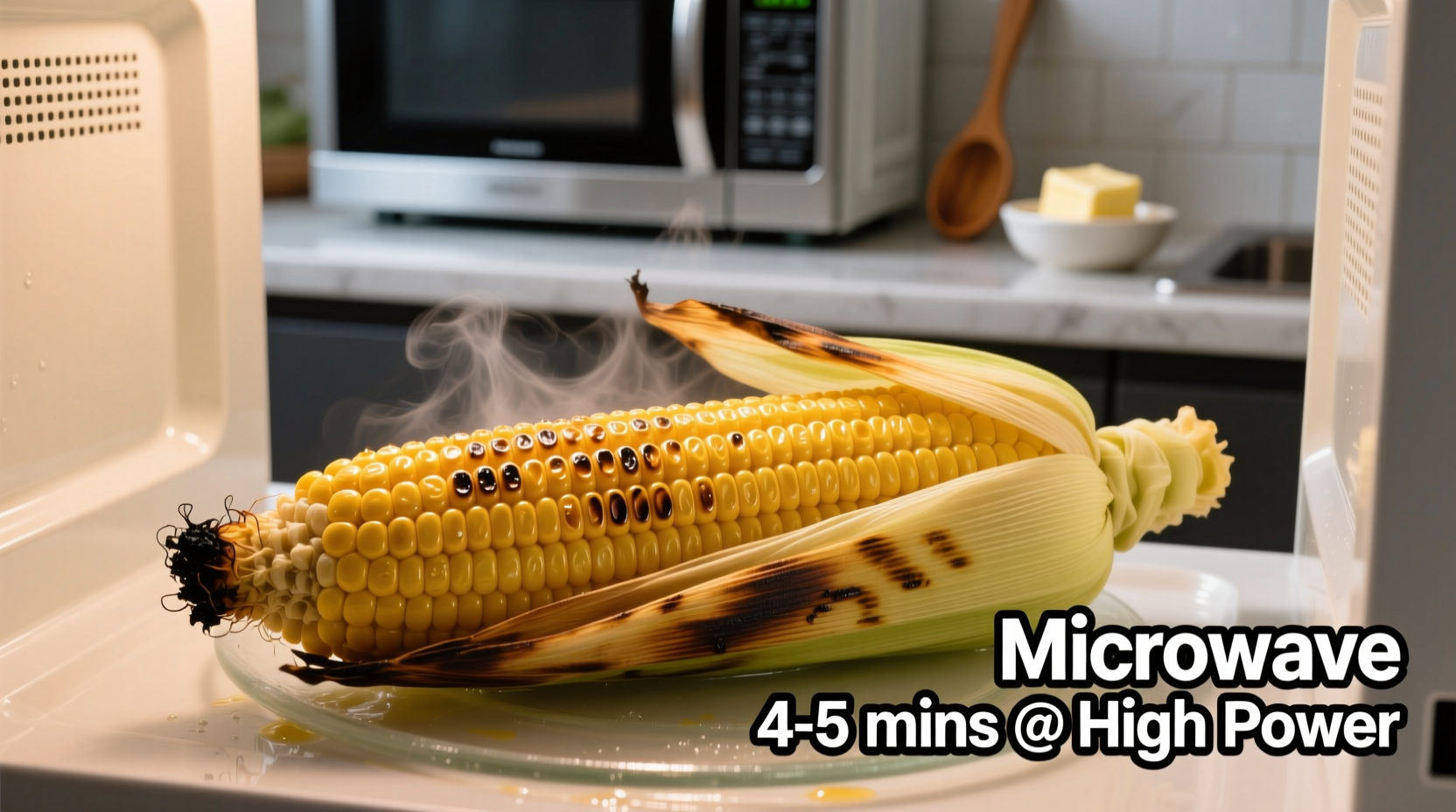Why Microwave Corn Cobs Instead of Traditional Methods?
When you're craving fresh corn but short on time, the microwave offers a surprisingly effective solution. Unlike boiling which leaches nutrients into water, microwaving corn in its husk seals in natural moisture and sweetness while cutting cooking time by 75%. According to the USDA Food Safety and Inspection Service, microwaving vegetables preserves more water-soluble vitamins like vitamin C compared to boiling methods (microwave food safety guidelines).
Your Microwave Corn Preparation Checklist
Before you start, gather these essentials:
- Fresh corn cobs with intact husks
- Sharp kitchen shears
- Microwave-safe plate
- Oven mitts (corn gets extremely hot)
- Optional: butter, salt, or flavorings
Step-by-Step Microwave Corn Cooking Guide
Follow these precise steps for consistently perfect results every time you cook corn cobs in microwave:
Step 1: Prepare the Corn Properly
Remove any loose outer husk layers and pull off the corn silk completely. Leaving the final 1-2 husk layers intact is crucial—they create a steam pocket that cooks the corn evenly. Research from Cornell University's Food Science Department confirms that cooking corn in its husk preserves up to 25% more nutrients compared to shucked methods.
Step 2: Optimize Microwave Placement
Arrange corn cobs side by side on a microwave-safe plate. If cooking multiple ears, rotate them halfway through cooking for even heating. Never stack corn cobs vertically as this creates uneven cooking.
| Number of Corn Cobs | Microwave Power Setting | Recommended Cooking Time |
|---|---|---|
| 1-2 ears | High (100%) | 4 minutes |
| 3-4 ears | High (100%) | 5 minutes |
| 5+ ears | Medium (50%) | 6-7 minutes |
Step 3: Execute Perfect Microwave Timing
Set your microwave according to the table above. The critical factor when learning how to cook corn cobs in microwave is avoiding overcooking—this makes kernels tough and chewy. University extension programs consistently recommend the 4-minute baseline for standard 1000W microwaves.
Step 4: Safe Handling After Cooking
After cooking, carefully remove the plate using oven mitts. Let corn rest for 2 minutes—this allows residual heat to finish cooking while making husks easier to remove. Never attempt to husk immediately as trapped steam can cause severe burns.
Step 5: Husking Technique for Perfect Results
Hold the corn vertically over a sink and pull husks downward. The silk should come off cleanly. If stubborn silk remains, use a damp paper towel to wipe it away. This method for cooking corn cobs in microwave produces kernels that are tender-crisp with maximum natural sweetness.

Troubleshooting Common Microwave Corn Issues
Even with this straightforward method of how to cook corn cobs in microwave, you might encounter these common problems:
Undercooked Corn
If kernels remain hard, return to microwave in 30-second increments. Different microwave wattages significantly affect cooking time—check your model's specifications. Most home microwaves range from 600-1200 watts, with lower wattage requiring longer cooking.
Overcooked or Mushy Corn
This usually happens when corn rests too long in the microwave after cooking. Always follow the 2-minute resting guideline. The USDA recommends that vegetables reach 165°F internally for safe consumption, which properly microwaved corn achieves within the recommended timeframes.
Advanced Tips for Flavorful Microwave Corn
Once you've mastered the basic technique for how to cook corn cobs in microwave, try these professional enhancements:
- Add flavor before cooking: Place a pat of butter and pinch of salt inside the husk before microwaving
- For smoky flavor: Add a drop of liquid smoke to the base of each cob
- Preserve leftovers: Store unhusked cooked corn in refrigerator for up to 3 days
- Reheat perfectly: Microwave previously cooked corn for 60-90 seconds on medium power
When Not to Use the Microwave Method
While this microwave corn cooking technique works for 95% of fresh corn situations, certain conditions require alternative approaches:
- Very old corn (more than 3 days post-harvest) benefits from boiling to rehydrate
- Large gatherings (10+ people) where conventional methods are more efficient
- Specialty corn varieties like ornamental or popcorn types
According to culinary research from the Culinary Institute of America, microwave cooking works best with corn harvested within 48 hours, as the natural sugars haven't yet converted significantly to starch.
Microwave vs. Traditional Corn Cooking Methods
Understanding when to choose microwave cooking over other methods helps you make informed decisions about how to cook corn cobs in microwave versus alternatives:
| Cooking Method | Time Required | Nutrient Retention | Best For |
|---|---|---|---|
| Microwave (in husk) | 4-6 minutes | High (85-90%) | Quick meals, single servings |
| Boiling | 8-12 minutes | Moderate (60-70%) | Large batches, soft texture preference |
| Grilling | 10-15 minutes | High (80-85%) | Summer barbecues, smoky flavor |
Perfect Your Microwave Corn Technique
Mastering how to cook corn cobs in microwave gives you a reliable, nutrient-preserving method that fits seamlessly into busy schedules. The key to success lies in precise timing based on your specific microwave wattage and the number of ears you're cooking. By following these evidence-based guidelines, you'll consistently achieve sweet, tender corn with minimal effort and maximum flavor preservation.











 浙公网安备
33010002000092号
浙公网安备
33010002000092号 浙B2-20120091-4
浙B2-20120091-4